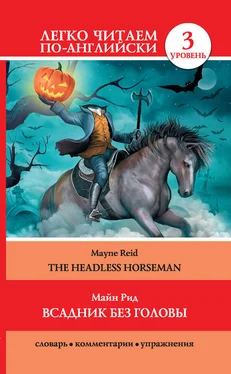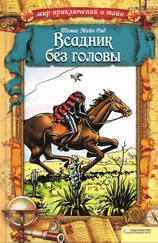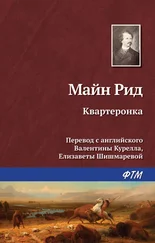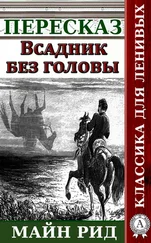There is a general halt, succeeded by an animated conversation among the white men. The situation is serious: the planter himself believes it to be so. He cannot that day reach the end of his journey – a thing upon which he had set his mind.
How are they to find their way?
Calhoun no longer volunteers to point out the path.
A ten minutes’ discussion terminates in nothing. No one can suggest a feasible plan of proceeding.
Another ten minutes is spent in the midst of moral and physical gloom. Then, as if by a benignant mandate from heaven, does cheerfulness resume its sway. The cause? A horseman riding in the direction of the train!
An unexpected sight: who could have looked for human being in such a place? All eyes simultaneously sparkle with joy; as if, in the approach of the horseman, they beheld the advent of a saviour!
“A Mexican!” whispered Henry, drawing his deduction from the habiliments of the horseman.
“So much the better,” replied Poindexter, in the same tone of voice; “he’ll be all the more likely to know the road.”
“Not a bit of Mexican about him,” muttered Calhoun,” excepting the rig. I’ll soon see. Buenos dias, cavallero! Esta V. Mexicano?” (Good day, sir! are you a Mexican?)
“No, indeed,” replied the stranger, with a protesting smile. “I can speak to you in Spanish, if you prefer it; but I dare say you will understand me better in English: which, I presume, is your native tongue?”
“American, sir,” replied Poindexter. Then, as if fearing to offend the man from whom he intended asking a favour, he added: “Yes, sir; we are all Americans – from the Southern States.”
“That I can perceive by your following.” An expression of contempt showed itself upon the countenance of the speaker, as his eye rested upon the groups of black bondsmen. “I can perceive, too,” he added, “that you are strangers to prairie travelling. You have lost your way?”
“We have, sir; and have very little prospect of recovering it, unless we may count upon your kindness to direct us.”
“Not much kindness in that. By chance I came upon your trail, as I was crossing the prairie. I saw you were going astray; and have ridden this way to set you right.”
“It is very good of you. We shall be most thankful, sir. My name is Woodley Poindexter, of Louisiana. I have purchased a property on the Leona river, near Fort Inge. We were in hopes of reaching it before nightfall. Can we do so?”
“There is nothing to hinder you: if you follow the instructions I shall give.”
On saying this, the stranger rode a few paces apart; and appeared to scrutinise the country – as if to determine the direction which the travellers should take.

A blood-bay [5]steed, such as might have been ridden by an Arab sheik. On his back a rider – a young man of not more than five-and-twenty – of noble form and features, dressed in the picturesque costume of a Mexican rancher [6]. Thus looked the horseman, upon whom the planter and his people were gazing.
Through the curtains of the travelling carriage he was regarded with glances that spoke of a singular sentiment. For the first time in her life, Louise Poindexter looked upon that – hitherto known only to her imagination— a man of heroic mould. [7]Proud might he have been, could he have guessed the interest which his presence was exciting in the breast of the young Creole. [8]
“By my faith!” he declared, facing round to the owner of the waggons, “I can discover no landmarks for you to steer by. For all that, I can find the way myself. You will have to cross the Leona five miles below the Fort; and, as I have to go by the crossing myself, you can follow the tracks of my horse. But you may not be able to distinguish them”, said the horseman after a pause, “the more so, that in these dry ashes all horse-tracks are so nearly alike.”
“What are we to do?” despairingly asked the planter.
“I am sorry, Mr Poindexter, I cannot stay to conduct you, I am riding express, with a despatch for the Fort. If you should lose my trail, keep the sun on your right shoulders: so that your shadows may fall to the left, at an angle of about fifteen degrees to your line of march. Go straight forward for about five miles. You will then come in sight of the top of a tall tree – a cypress. [9]Head direct for this tree. It stands on the bank of the river; and close by is the crossing.”
The young horseman, once more drawing up his reins, was about to ride off; when something caused him to linger. It was a pair of dark lustrous eyes – observed by him for the first time – glancing through the curtains of the travelling carriage.
He perceived, moreover, that they were turned upon himself – fixed, as he fancied, in an expression that betokened interest – almost tenderness!
He returned it with an involuntary glance of admiration, which he made but an awkward attempt to conceal.
“You are very kind, sir,” said Poindexter; “but with the directions you have given us, I think we shall be able to manage. The sun will surely show us —”
“No: now I look at the sky, it will not. There are clouds looming up on the north. In an hour, the sun may be obscured – at all events, before you can get within sight of the cypress. It will not do. Stay!” he continued, after a reflective pause, “I have a better plan still: follow the trail of my lazo!”
While speaking, he had lifted the coiled rope and flung the loose end to the earth – the other being secured to a ring in the pommel. Then raising his hat in graceful salutation – more than half directed towards the travelling carriage – he gave the spur to his steed.
The lazo, lengthening out, tightened over the hips of his horse; and, dragging a dozen yards behind, left a line upon the cinereous surface.
Answer the following questions:
1) Who is the owner of the train? Where is he from? Where is he going to?
2) Who accompanies the planter?
3) Why is it hard to find the way?
4) Why did the overseer stop? Who becomes a new guide?
5) Who had left those wheel-tracks that Cassius Calhoun decided to follow?
6) Why did Calhoun’s confident look become clouded?
7) Who helped the travellers find the way? How did he do it?
8) Why didn’t the horseman stay with the travellers to conduct them?
“An exceedingly curious fellow!” remarked the planter, as they stood gazing after the horseman. “I ought to have asked him his name?”
“An exceedingly conceited fellow, I should say,” muttered Calhoun; who had not failed to notice the glance sent by the stranger in the direction of the carriole, nor that which had challenged it.
“Come, cousin Cash,” protested young Poindexter; “you are unjust to the stranger. He appears to be educated – in fact, a gentleman.”
During this brief conversation, the fair occupant of the carriole was seen to bend forward; and direct a look of evident interest, after the form of the horseman fast receding from her view.
To this, perhaps, might have been traced the acrimony observable in the speech of Calhoun.
“What is it, Loo?” he inquired, riding close up to the carriage, and speaking in a voice not loud enough to be heard by the others. “You appear impatient to go forward? Perhaps you’d like to ride off along with that fellow? It isn’t too late: I’ll lend you my horse.”
The young girl threw herself back upon the seat – evidently displeased, both by the speech and the tone in which it was delivered. A clear ringing laugh was her only reply.
Читать дальше
Конец ознакомительного отрывка
Купить книгу









